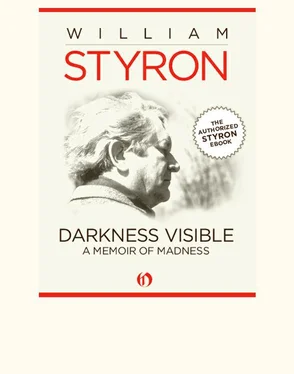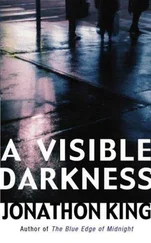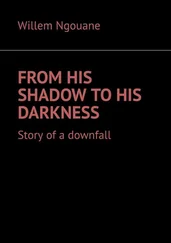William Styron - Darkness Visible
Здесь есть возможность читать онлайн «William Styron - Darkness Visible» весь текст электронной книги совершенно бесплатно (целиком полную версию без сокращений). В некоторых случаях можно слушать аудио, скачать через торрент в формате fb2 и присутствует краткое содержание. Город: New York, Год выпуска: 2010, ISBN: 2010, Издательство: Open Road Integrated Media, Жанр: Биографии и Мемуары, Психология, на английском языке. Описание произведения, (предисловие) а так же отзывы посетителей доступны на портале библиотеки ЛибКат.
- Название:Darkness Visible
- Автор:
- Издательство:Open Road Integrated Media
- Жанр:
- Год:2010
- Город:New York
- ISBN:978-1-936317-29-5
- Рейтинг книги:5 / 5. Голосов: 1
-
Избранное:Добавить в избранное
- Отзывы:
-
Ваша оценка:
- 100
- 1
- 2
- 3
- 4
- 5
Darkness Visible: краткое содержание, описание и аннотация
Предлагаем к чтению аннотацию, описание, краткое содержание или предисловие (зависит от того, что написал сам автор книги «Darkness Visible»). Если вы не нашли необходимую информацию о книге — напишите в комментариях, мы постараемся отыскать её.
Darkness Visible — читать онлайн бесплатно полную книгу (весь текст) целиком
Ниже представлен текст книги, разбитый по страницам. Система сохранения места последней прочитанной страницы, позволяет с удобством читать онлайн бесплатно книгу «Darkness Visible», без необходимости каждый раз заново искать на чём Вы остановились. Поставьте закладку, и сможете в любой момент перейти на страницу, на которой закончили чтение.
Интервал:
Закладка:
On the day of the award ceremony, which was to take place at noon and be followed by a formal luncheon, I woke up at midmorning in my room at the Hôtel Pont-Royal commenting to myself that I felt reasonably sound, and I passed the good word along to my wife, Rose. Aided by the minor tranquilizer Halcion, I had managed to defeat my insomnia and get a few hours’ sleep. Thus I was in fair spirits. But such wan cheer was an habitual pretense which I knew meant very little, for I was certain to feel ghastly before nightfall. I had come to a point where I was carefully monitoring each phase of my deteriorating condition. My acceptance of the illness followed several months of denial during which, at first, I had ascribed the malaise and restlessness and sudden fits of anxiety to withdrawal from alcohol; I had abruptly abandoned whiskey and all other intoxicants that June. During the course of my worsening emotional climate I had read a certain amount on the subject of depression, both in books tailored for the layman and in weightier professional works including the psychiatrists’ bible, DSM (The Diagnostic and Statistical Manual of the American Psychiatric Association). Throughout much of my life I have been compelled, perhaps unwisely, to become an autodidact in medicine, and have accumulated a better-than-average amateur’s knowledge about medical matters (to which many of my friends, surely unwisely, have often deferred), and so it came as an astonishment to me that I was close to a total ignoramus about depression, which can be as serious a medical affair as diabetes or cancer. Most likely, as an incipient depressive, I had always subconsciously rejected or ignored the proper knowledge; it cut too close to the psychic bone, and I shoved it aside as an unwelcome addition to my store of information.
At any rate, during the few hours when the depressive state itself eased off long enough to permit the luxury of concentration, I had recently filled this vacuum with fairly extensive reading and I had absorbed many fascinating and troubling facts, which, however, I could not put to practical use. The most honest authorities face up squarely to the fact that serious depression is not readily treatable. Unlike, let us say, diabetes, where immediate measures taken to rearrange the body’s adaptation to glucose can dramatically reverse a dangerous process and bring it under control, depression in its major stages possesses no quickly available remedy: failure of alleviation is one of the most distressing factors of the disorder as it reveals itself to the victim, and one that helps situate it squarely in the category of grave diseases. Except in those maladies strictly designated as malignant or degenerative, we expect some kind of treatment and eventual amelioration, by pills or physical therapy or diet or surgery, with a logical progression from the initial relief of symptoms to final cure. Frighteningly, the layman-sufferer from major depression, taking a peek into some of the many books currently on the market, will find much in the way of theory and symptomatology and very little that legitimately suggests the possibility of quick rescue. Those that do claim an easy way out are glib and most likely fraudulent. There are decent popular works which intelligently point the way toward treatment and cure, demonstrating how certain therapies—psychotherapy or pharmacology, or a combination of these—can indeed restore people to health in all but the most persistent and devastating cases; but the wisest books among them underscore the hard truth that serious depressions do not disappear overnight. All of this emphasizes an essential though difficult reality which I think needs stating at the outset of my own chronicle: the disease of depression remains a great mystery. It has yielded its secrets to science far more reluctantly than many of the other major ills besetting us. The intense and sometimes comically strident factionalism that exists in present-day psychiatry—the schism between the believers in psychotherapy and the adherents of pharmacology—resembles the medical quarrels of the eighteenth century (to bleed or not to bleed) and almost defines in itself the inexplicable nature of depression and the difficulty of its treatment. As a clinician in the field told me honestly and, I think, with a striking deftness of analogy: “If you compare our knowledge with Columbus’s discovery of America, America is yet unknown; we are still down on that little island in the Bahamas.”
In my reading I had learned, for example, that in at least one interesting respect my own case was atypical. Most people who begin to suffer from the illness are laid low in the morning, with such malefic effect that they are unable to get out of bed. They feel better only as the day wears on. But my situation was just the reverse. While I was able to rise and function almost normally during the earlier part of the day, I began to sense the onset of the symptoms at midafternoon or a little later—gloom crowding in on me, a sense of dread and alienation and, above all, stifling anxiety. I suspect that it is basically a matter of indifference whether one suffers the most in the morning or the evening: if these states of excruciating near-paralysis are similar, as they probably are, the question of timing would seem to be academic. But it was no doubt the turnabout of the usual daily onset of symptoms that allowed me that morning in Paris to proceed without mishap, feeling more or less self-possessed, to the gloriously ornate palace on the Right Bank that houses the Fondation Cino del Duca. There, in a rococo salon, I was presented with the award before a small crowd of French cultural figures, and made my speech of acceptance with what I felt was passable aplomb, stating that while I was donating the bulk of my prize money to various organizations fostering French-American goodwill, including the American Hospital in Neuilly, there was a limit to altruism (this spoken jokingly) and so I hoped it would not be taken amiss if I held back a small portion for myself.
What I did not say, and which was no joke, was that the amount I was withholding was to pay for two tickets the next day on the Concorde, so that I might return speedily with Rose to the United States, where just a few days before I had made an appointment to see a psychiatrist. For reasons that I’m sure had to do with a reluctance to accept the reality that my mind was dissolving, I had avoided seeking psychiatric aid during the past weeks, as my distress intensified. But I knew I couldn’t delay the confrontation indefinitely, and when I did finally make contact by telephone with a highly recommended therapist, he encouraged me to make the Paris trip, telling me that he would see me as soon as I returned. I very much needed to get back, and fast. Despite the evidence that I was in serious difficulty, I wanted to maintain the rosy view. A lot of the literature available concerning depression is, as I say, breezily optimistic, spreading assurances that nearly all depressive states will be stabilized or reversed if only the suitable antidepressant can be found; the reader is of course easily swayed by promises of quick remedy. In Paris, even as I delivered my remarks, I had a need for the day to be over, felt a consuming urgency to fly to America and the office of the doctor, who would whisk my malaise away with his miraculous medications. I recollect that moment clearly now, and am hardly able to believe that I possessed such ingenuous hope, or that I could have been so unaware of the trouble and peril that lay ahead.
Simone del Duca, a large dark-haired woman of queenly manner, was understandably incredulous at first, and then enraged, when after the presentation ceremony I told her that I could not join her at lunch upstairs in the great mansion, along with a dozen or so members of the Académie Française, who had chosen me for the prize. My refusal was both emphatic and simpleminded; I told her point-blank that I had arranged instead to have lunch at a restaurant with my French publisher, Françoise Gallimard. Of course this decision on my part was outrageous; it had been announced months before to me and everyone else concerned that a luncheon—moreover, a luncheon in my honor—was part of the day’s pageantry. But my behavior was really the result of the illness, which had progressed far enough to produce some of its most famous and sinister hallmarks: confusion, failure of mental focus and lapse of memory. At a later stage my entire mind would be dominated by anarchic disconnections; as I have said, there was now something that resembled bifurcation of mood: lucidity of sorts in the early hours of the day, gathering murk in the afternoon and evening. It must have been during the previous evening’s murky distractedness that I made the luncheon date with Françoise Gallimard, forgetting my del Duca obligations. That decision continued to completely master my thinking, creating in me such obstinate determination that now I was able to blandly insult the worthy Simone del Duca. “Alors!” she exclaimed to me, and her face flushed angrily as she whirled in a stately volte-face, “au … re-voir!” Suddenly I was flabbergasted, stunned with horror at what I had done. I fantasized a table at which sat the hostess and the Académie Française, the guest of honor at La Coupole. I implored Madame’s assistant, a bespectacled woman with a clipboard and an ashen, mortified expression, to try to reinstate me: it was all a terrible mistake, a mixup, a malentendu. And then I blurted some words that a lifetime of general equilibrium, and a smug belief in the impregnability of my psychic health, had prevented me from believing I could ever utter; I was chilled as I heard myself speak them to this perfect stranger. “I’m sick,” I said, “un problème psychiatrique.”
Читать дальшеИнтервал:
Закладка:
Похожие книги на «Darkness Visible»
Представляем Вашему вниманию похожие книги на «Darkness Visible» списком для выбора. Мы отобрали схожую по названию и смыслу литературу в надежде предоставить читателям больше вариантов отыскать новые, интересные, ещё непрочитанные произведения.
Обсуждение, отзывы о книге «Darkness Visible» и просто собственные мнения читателей. Оставьте ваши комментарии, напишите, что Вы думаете о произведении, его смысле или главных героях. Укажите что конкретно понравилось, а что нет, и почему Вы так считаете.












